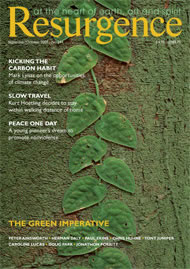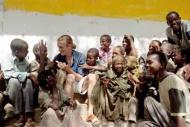September 7, 2001: the day that helped change the world for ever occurred just hours before the day that already has. Let me explain. When young British film-maker and activist Jeremy Gilley witnessed the culmination of three years’ work, tens of thousands of miles through dozens of countries, involving hundreds of meetings (with peacemakers such as the Dalai Lama and Nelson Mandela) that finally results in UN Resolution 55/282, he knew things would never be the same again. After all, the United Nations had, for one of the few times in its history, genuinely united as nations, to unanimously declare 21st September an annual day of global ceasefire and nonviolence.
But the joyful remodelling of the UN International Day of Peace in New York was about to be brutally overshadowed. Just four days later, the twin towers were destroyed and more than 3,000 people murdered, and in response the world’s most powerful nations again unite. But this time to declare war, not peace.
Fast forward five years, to 21st September 2006: to Peace One Day (POD) documenting life-saving initiatives in southern Sudan, immunisation campaigns in a further nine countries, marches, festivals, music, sport and dance events, multi-faith celebrations and a Song for Peace initiative that involves 2.2 million young people in the UK joining 27.6 million in 200 countries across the world in creating a new kind of history, united in making a difference.
Talking to Gilley is like trying to contain a waterfall: any resistance is washed away in a torrent of enthusiasm and energy. During our interview I frantically scribble notes of the initiatives and events for POD07. Thirty minutes and twenty undecipherable pages later, you can see why Kofi Annan never stood a chance! But here are just a few highlights: inspired by the 33,000 children Gilley has spoken to in fifty-four countries, POD is producing and distributing a second edition of its Citizen Resource Pack free to every secondary school in the UK (an international version is in development) to help remind young people, their parents and teachers that peace is not just for one day, but a 365-day commitment, and that nonviolence is an inalienable right in any community, classroom or home. There will be more immunisation programmes (including this year Afghanistan), and events in the UK will feature a flagship concert at the Royal Albert Hall on 21st September 2007 with appearances by, among others, Annie Lennox, Corrine Bailey Rae, and Beth Orton
But perhaps the most far-
reaching initiative was the July launch of a new website (www.peaceoneday.org) and a ‘digital wristband’ for everyone who logs a commitment to ‘make peace’. Whether it is just to reach out, to say sorry to a friend, father, mother, brother, sister, this commitment will become part of the ‘viral social network’ on websites including Facebook and MySpace, and on emails, to help facilitate a global exercise on an unprecedented scale. And Gilley is already focused on looking forward to 2008, to the tenth year of his project and to creating new places of expression for poets, film-makers, writers, thinkers, to PeaceTV and Peacepodcasts.
With enough faith, enough work, commitment and energy, perhaps in POD’s centenary year, 9/11 may be seen as an aberration and the significant event of September 2001 will instead be the day that the peoples of the world first came together to help create a nonviolent legacy. As someone very famous once said, “Blessed are the peacemakers.”








